| |||||||||||||||||||||||||||||
3,882 delegates to the 1984 Democratic National Convention 1,942 (majority) votes needed to win | |||||||||||||||||||||||||||||
|---|---|---|---|---|---|---|---|---|---|---|---|---|---|---|---|---|---|---|---|---|---|---|---|---|---|---|---|---|---|
| |||||||||||||||||||||||||||||
 Grey denotes a territory that did not hold a primary or caucus. | |||||||||||||||||||||||||||||
| |||||||||||||||||||||||||||||
From February 20 to June 12, 1984, voters of the Democratic Party chose its nominee for president in the 1984 United States presidential election. Former Vice President Walter Mondale was selected as the nominee through a series of primary elections and caucuses culminating in the 1984 Democratic National Convention held from July 16 to July 19, 1984, in San Francisco, California.
Primary race
Only three candidates won any state primaries: Walter Mondale, Gary Hart, and Jesse Jackson. Initially, former Vice President Mondale was viewed as the favorite to win the Democratic nomination, especially after he was endorsed early in the primary by Former President Jimmy Carter. Mondale had the largest number of party leaders supporting him, and he had raised more money than any other candidate. However, both Jackson and Hart emerged as surprising, and troublesome, opponents for Mondale.
Jackson was the second African-American (after Shirley Chisholm) to mount a nationwide campaign for the presidency, and he was the first African-American candidate to be a serious contender. He garnered 3.5 million votes during the primaries, third behind Hart and Mondale. He managed to win Washington DC, South Carolina, and Louisiana, and split Mississippi, where there were two separate contests for Democratic delegates. Through the primaries, Jackson helped confirm the black electorate's importance to the Democratic Party in the South at the time. During the campaign, however, Jackson made an off-the-cuff reference to Jews as "Hymies" and New York City as "Hymietown", for which he later apologized. Nonetheless, the remark was widely publicized, and derailed his campaign for the nomination.[1] Jackson ended up winning 21% of the national primary vote but received only 8% of the delegates to the national convention, and he initially charged that his campaign was hurt by the same party rules that allowed Mondale to win. He also poured scorn on Mondale, saying that Hubert Humphrey was the "last significant politician out of the St. Paul-Minneapolis" area.[2]

Colorado Senator Gary Hart was little-known when he announced his run February 1983, and barely received above 1% in the polls compared to other well-known figures. To counter this, Hart started campaigning early in New Hampshire, making a then-unprecedented canvassing tour in late September, months before the primary. This strategy attracted national media attention to his campaign, and by late 1983, he had risen moderately in the polls to the middle of the field, mostly at the expense of the sinking candidacies of John Glenn and Alan Cranston. Mondale easily won the Iowa caucus in late February,[3][4] but Hart polled a better-than-expected 16%. A week later, in the New Hampshire primary, he shocked much of the party establishment and the media by defeating Mondale by ten percentage points. Hart instantly became the main challenger to Mondale for the nomination, and appeared to have the momentum on his side.
Hart criticized Mondale as an "old-fashioned" Great Society Democrat who symbolized "failed policies" of the past. Hart positioned himself as a younger, fresher, and more moderate Democrat who could appeal to younger voters. He emerged as a formidable candidate, winning the key Ohio and California primaries as well as several others, especially in the West. However, Hart could not overcome Mondale's financial and organizational advantages, especially among labor union leaders in the Midwest and industrial Northeast. Hart was also badly hurt during a televised debate when Mondale used a popular television commercial slogan to ridicule Hart's vague "New Ideas" platform. Turning to Hart on camera, Mondale said that whenever he heard Hart talk about his "New Ideas", he was reminded of the Wendy's fast-food slogan "Where's the beef?". The remark drew loud laughter and applause from the audience and caught Hart off-guard. Hart never fully recovered from Mondale's charge that his "New Ideas" were shallow and lacking in specifics. Earlier in the same Democratic primary debate, Hart committed a serious faux pas that largely went underreported. Asked what he would do if an unidentified airplane flew over the Iron Curtain from a Warsaw Pact nation, Hart replied that he would send up a United States Air Force plane and instruct them to determine whether or not it was an enemy plane by looking in the cockpit window to see if the pilots were wearing uniforms. Fellow candidate John Glenn, a former Marine Corps fighter pilot, replied that this was physically impossible.
At a roundtable debate between the three remaining Democratic candidates moderated by Phil Donahue, Mondale and Hart got in such a heated argument over the issue of U.S. policy in Central America that Jackson had to tap his water glass on the table to get them to simmer down.
Mondale gradually pulled away from Hart in the delegate count, but the race was not decided until June, on "Super Tuesday III".[5] Decided that day were delegates from five states: South Dakota, New Mexico, West Virginia, and the big prizes of California and New Jersey.[6] The proportional nature of delegate selection meant that Mondale was likely to obtain enough delegates on that day to secure the stated support of an overall majority of delegates, and hence the nomination, no matter who actually "won" the states contested. However, Hart maintained that unpledged superdelegates that had previously claimed support for Mondale would shift to his side if he swept the Super Tuesday III primary.[7] Once again, Hart committed a faux pas, insulting New Jersey shortly before the primary day. Campaigning in California, he remarked that while the "bad news" was that he and his wife Lee had to campaign separately, "[t]he good news for her is that she campaigns in California while I campaign in New Jersey." Compounding the problem, when his wife interjected that she "got to hold a koala bear," Hart replied that "I won't tell you what I got to hold: samples from a toxic-waste dump."[7] While Hart won California, he decisively lost New Jersey after leading in polls by as much as 15 points.
By the time the Democratic Convention started in San Francisco, Mondale had more than enough delegates to win the Democratic nomination. However, after Mondale's landslide loss to Ronald Reagan, Hart would quickly emerge as the frontrunner for the 1988 Democratic Party's presidential nomination. He would maintain that status until a sex scandal derailed his candidacy in 1987.
Mondale's nomination marked only the fifth time that the Democratic Party nominated a private citizen for President (i.e., not serving in an official government role at the time of the nomination and election), following former Georgia Governor Jimmy Carter in 1976, who followed former Illinois Governor Adlai Stevenson II in 1956, who followed former West Virginia Congressman John W. Davis in 1924, who was preceded by former President Grover Cleveland in 1892. The Democratic Party did not nominate another private citizen until former Secretary of State Hillary Clinton, in 2016. Four years later, the party nominated former vice president Joe Biden. Of the seven private-citizen Democratic nominees, only Jimmy Carter, Grover Cleveland, and Joe Biden won their respective presidential elections.[8]
Candidates
Nominee
| Candidate | Most recent office | Home state | Campaign
Withdrawal date |
Popular vote | Contests won | Running mate | ||
|---|---|---|---|---|---|---|---|---|
| Walter Mondale |  |
Vice President of the United States (1977–1981) |

|

(Campaign) |
6,952,912
(38.3%) |
22 NY, NJ, DE, MD, PA, VA, WV, NC, GA, AL, TN, KY, MI, IL, AR, MO, IA, MN, KS, TX, HI, PR |
Geraldine Ferraro | |
Withdrew during primaries or convention
| Candidate | Most recent office | Home state | Campaign
Withdrawal date |
Popular vote | Contests won | ||
|---|---|---|---|---|---|---|---|
| Gary Hart |  |
U.S. Senator from Colorado (1975–1987) |
 Colorado |
(Campaign) |
6,504,842 (35.9%) |
26 ME, NH, VT, MA, CT, RI, FL, OH, IN, WI, OK, NE, SD, ND, NM, CO, WY, MT, AZ, UT, ID, NV, WA, OR, CA, AK | |
| Jesse Jackson |  |
None | 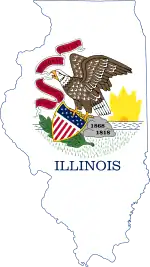 Illinois |
(Campaign) |
3,282,431 (18.1%) |
4 LA, MS, SC, DC | |
Withdrew during primaries
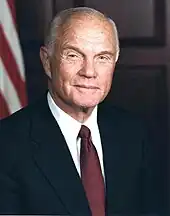 Senator John Glenn of Ohio (March 16, 1984)
Senator John Glenn of Ohio (March 16, 1984)

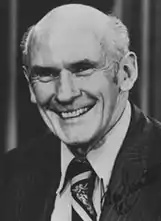 Senator Alan Cranston of California (February 29, 1984)
Senator Alan Cranston of California (February 29, 1984)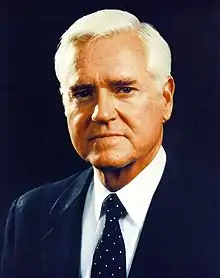 Senator Ernest Hollings of South Carolina (March 1, 1984)
Senator Ernest Hollings of South Carolina (March 1, 1984)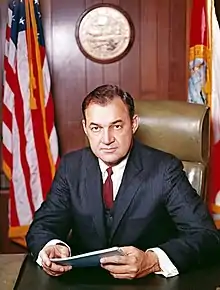
Declined to run
- Governor Bruce Babbitt of Arizona
- Senator Lloyd Bentsen of Texas
- Senator Joe Biden of Delaware
- Senator Bill Bradley of New Jersey
- Governor John Y. Brown of Kentucky
- Senator Dale Bumpers of Arkansas
- Former President Jimmy Carter of Georgia (endorsed Mondale)
- Governor Mario Cuomo of New York
- Delegate Walter Fauntroy of Washington D.C. (endorsed Jackson)
- Senator Ted Kennedy of Massachusetts (Dec. 1, 1982)
- Senator Daniel Patrick Moynihan of New York
- Governor Jay Rockefeller of West Virginia
- Former DNC Chairman Robert S. Strauss of Texas
- Representative Mo Udall of Arizona (endorsed Hart)
Timeline
| Nominee | |
| Ended campaigns | |
| Iowa caucuses | |
| New Hampshire primary | |
| Super Tuesday | |
| Convention 1984 |

Endorsements
Mondale had received endorsements from:
- United States House of Representatives
- Representative Jim Bates of California[10]
- Representative Edward Boland of Massachusetts[11]
- Representative Rick Boucher of Virginia[12]
- Representative Joseph D. Early of Massachusetts[11]
- Representative Barney Frank of Massachusetts[11]
- Representative Robert García of New York[13]
- Representative Sam Gejdenson of Connecticut[11]
- Representative Tom Harkin of Iowa[14]
- Representative Joe Moakley of Massachusetts[11]
- Representative Charles B. Rangel of New York[15]
- Representative William R. Ratchford of Connecticut[11]
- Representative James Michael Shannon of Massachusetts[11]
- Governors and State Constitutional officers
- New York Attorney General Robert Abrams[13]
- Governor Mario Cuomo of New York[13]
- Lieutenant Governor Zell Miller of Georgia[16]
- Former officeholders
- Former President Jimmy Carter of Georgia[17]
- Former diplomats, board members and other officials
- Organizations and unions
- AFL–CIO[17]
- Alabama Democratic Conference[18]
- National Education Association[19]
- National Organization for Women[19]
- Current and former state and local officials and party officeholders
- Alabama
- Mayor Richard Arrington, Jr. of Birmingham[20]
- California
- Mayor and 1982 Democratic Gubernatorial nominee Tom Bradley of Los Angeles[21]
- Georgia
- State Senator Julian Bond[16]
- Illinois
- Former Alderman, President of the City Council, 1983 mayoral candidate, and Cook County Democratic Party Chairman Edward Vrdolyak of Chicago[22]
- Michigan
- Mayor Coleman Young of Detroit[21]
Hart had received endorsements from:
- United States House of Representatives
- Representative Patricia Schroeder of Colorado[23]
- Representative Chuck Schumer of New York[24]
- Representative and 1976 Democratic presidential candidate Mo Udall of Arizona[25]
- Representative Henry A. Waxman of California[26]
- Celebrities, political activists, and political commentators
- Actor and director Warren Beatty[27]
Jackson had received endorsements from:
- United States House of Representatives
- Delegate Walter E. Fauntroy of Washington, D.C.[28]
- Former officeholders
- Former Representative and 1972 Democratic presidential candidate Shirley Chisholm of New York[29]
- Former Governor Orval E. Faubus of Arkansas[30]
- Current and former state and local officials and party officeholders
- Alabama
- State Senator Michael Figures[31]
- Mayor Johnny Ford of Tuskegee[32]
- State Senator Earl Hilliard[32]
- State Senator Hank Sanders[20]
- Georgia
- State Representative Tyrone Brookes[33]
- Illinois
- Mayor Carl Officer of East St. Louis[33]
- Indiana
- Mayor Richard G. Hatcher of Gary[22]
- Washington, D.C.
- Mayor Marion Barry of Washington, D.C.[34]
- Organizations and unions
- Church of God in Christ[35]
- Nation of Islam[35]
- National Baptist Convention of America, Inc.[35]
- National Baptist Convention, USA, Inc.[36]
- National Farmers Alliance[29]
- National Hispanic Leadership Conference[29]
- Celebrities, political activists, and political commentators
- Muhammad Ali
- 1980 presidential nominee of the Citizens Party Barry Commoner[37]
Hollings had received endorsements from:
- United States Senate
- Former U.S. Senator Birch Bayh of Indiana[38]
- Former U.S. Senator William B. Spong, Jr. of Virginia[39]
- State Constitutional officers
- Lieutenant Governor Martha Griffiths of Michigan[40]
- State Senator Anna Belle Clement O'Brien of Tennessee[41]
- Lieutenant Governor Nancy Stevenson of South Carolina[40]
Glenn had received endorsements from:
- United States Senate
- Senator Sam Nunn of Georgia[42]
- Senator Jim Sasser of Tennessee[43]
- Senator Paul Tsongas of Massachusetts[44]
- United States House of Representatives
- Representative Jerry Huckaby of Louisiana[11]
- Governors and State Constitutional officers
- Current and former state and local officials and party officeholders
- Georgia
- Commissioner of Agriculture Tommy Irvin[16]
- Texas
- State Representative Larry Walker[16]
- Celebrities
- Actor and director Warren Beatty[27]
Cranston had received endorsements from:
- United States House of Representatives
- Representative William Lehman of Florida[11]
Askew had received endorsements from:
- United States Senate
- Senator Lawton Chiles of Florida[20]
- United States House of Representatives
- Representative William V. Chappell, Jr. of Florida[11]
- Representative Dante Fascell of Florida[11]
- Representative Sam Gibbons of Florida[11]
- Representative Dan Mica of Florida[11]
- Governors and State Constitutional officers
- Governor Bob Graham of Florida[47]
- Current and former state and local officials and party officeholders
- Florida
- Mayor Eva Mack of West Palm Beach[48]
Opinion polling
Before 1983
| Poll source | Date(s) | ||||||||
|---|---|---|---|---|---|---|---|---|---|
| Gallup[49][50] | Apr. 23–26, 1982 | 6% | 11% | 6% | 45% | – | 12% | 9%[lower-alpha 1] | 11% |
| Gallup[50] | July 30–Aug. 2, 1982 | 4% | 8% | 7% | 43% | – | 13% | 25%[lower-alpha 2] | |
| Gallup[50][51] | Dec. 10–13, 1982 | 5% | – | 14% | – | 6% | 32% | 17%[lower-alpha 3] | 26% |
- ↑ Combined for Jay Rockefeller, John Y. Brown Jr., Bruce Babbitt, Daniel Patrick Moynihan, Bill Bradley, Alan Cranston, Gary Hart, Ernest Hollings, Reubin Askew, and Robert Strauss, each of whom received less than 2%.
- ↑ Jay Rockefeller, John Y. Brown Jr., Bruce Babbitt, Daniel Patrick Moynihan, Bill Bradley, Alan Cranston, Gary Hart, Ernest Hollings, Reubin Askew, and Robert Strauss were included in the poll but each received less than 2%.
- ↑ Gary Hart with 2%, Alan Cranston with 2%, Reubin Askew with 1%, Ernest Hollings with 1% and less than 2% each for Bruce Babbitt, John Brown, Jay Rockefeller, Lloyd Bentsen, Daniel Patrick Moynihan, Bill Bradley, Mo Udall, Robert Strauss.
1983
| Poll source | Publication | ||||||||
|---|---|---|---|---|---|---|---|---|---|
| Gallup[50] | Mar. 1983 | 2% | 3% | 13% | 2% | 1% | – | 4% | 32% |
| Gallup[50] | Apr. 1983 | 1% | 3% | 23% | 4% | 1% | – | – | 29% |
| Gallup[50] | June 1983 | 3% | 8% | 24% | 3% | 1% | – | – | 41% |
| Gallup[50] | July 1983 | 2% | 7% | 25% | 4% | 2% | – | – | 41% |
| Gallup[50] | Sep. 1983 | 3% | 5% | 23% | 3% | 1% | 8% | 8% | 34% |
| Gallup[50] | Oct. 1983 | 1% | 6% | 21% | 3% | 1% | 10% | 8% | 40% |
| Gallup[50] | Oct. 1983 | 2% | 3% | 23% | 1% | 1% | 8% | 7% | 34% |
| Gallup[50] | Nov. 1983 | 3% | 3% | 19% | 2% | 1% | 7% | 7% | 47% |
| Gallup[50] | Dec. 1983 | 1% | 3% | 24% | 3% | 1% | 10% | 8% | 40% |
1984
| Poll source | Publication | ||||||||
|---|---|---|---|---|---|---|---|---|---|
| Gallup[50] | Jan. 1984 | 1% | 4% | 16% | 3% | 1% | 9% | 4% | 47% |
| Gallup[50] | Jan. 1984 | 2% | 3% | 15% | 2% | 1% | 11% | 7% | 47% |
| Gallup[50] | Feb. 1984 | 2% | 3% | 13% | 3% | 1% | 13% | 5% | 49% |
Results by state
| Delegates | Walter Mondale |
Gary Hart |
Jesse Jackson |
John Glenn |
Uncommitted | Others | ||
|---|---|---|---|---|---|---|---|---|
| February 20 | Iowa caucus | 50 | 36,675 (48.89%) | 12,375 (16.50%) | 1,125 (1.50%) | 2,625 (3.50%) | 7,050 (9.40%) | 15,160 (20.21%) |
| February 28 | New Hampshire primary | 18 | 28,173 (27.88%) | 37,702 (37.31%) | 5,311 (5.26%) | 12,088 (11.96%) | - | 17,771 (17.59%) |
| March 4 | Maine caucuses | 43.4 | 50.2 | |||||
| March 6 | Vermont | 13 | 458 | 677 | 192 | 0 | 68 | - |
| March 10 | Wyoming | 12 | 1,266 | 2,130 | 14 | 3 | 108 | 8 |
| March 13 | Alabama | 52 | 148,165 (34.60%) | 88,465 (20.66%) | 83,787 (19.56%) | 89,286 (20.85%) | 4,464 (1.04%) | 14,116 (3.30%) |
| Democrats Abroad primary | 6 | 37.54% | 30.89% | 9.62% | 4.03% | 8.98% | - | |
| Florida | 111 | 394,279 (33.36%) | 463,661 (39.23%) | 144,229 (12.20%) | 128,154 (10.84%) | - | 51,627 (4.37%) | |
| Georgia | 71 | 208,588 (30.47%) | 186,853 (27.30%) | 143,730 (21.00%) | 122,744 (17.93%) | 3,068 (0.45%) | 19,503 (2.85%) | |
| Massachusetts | 103 | 160,893 (25.50%) | 245,943 (38.98%) | 31,824 (5.04%) | 45,456 (7.20%) | 5,080 (0.81%) | 141,766 (22.47%)
134,341 (21.29%) for McGovern | |
| Rhode Island | 15,338 (34.46%) | 20,011 (44.96%) | 3,875 (8.71%) | 2,249 (5.05%) | 439 (0.99%) | 2,599 (5.84%)
2,146 (4.82%) for McGovern | ||
| March 17 | Michigan | 50.70% | 32.32% | 16.98% | - | - | - | |
| March 18 | Puerto Rico | 99.06% | 0.61% | - | 0.31% | - | - | |
| March 20 | Illinois primary | 40.43% | 35.23% | 21.02% | 1.19% | - | - | |
| Minnesota caucus | 62% | 7% | 3% | - | - | - | ||
| March 27 | Connecticut | 29.08% | 52.66% | 11.95% | 0.43% | 0.89% | - | |
| April 3 | New York | 621,581 (44.79%) | 380,564 (27.42%) | 355,541 (25.62%) | 15,941 (1.15%) | - | - | |
| April 3 | Wisconsin | 41.11% | 44.42% | 9.83% | 1.01% | 1.11% | - | |
| April 7 | Wisconsin caucus | 54.07% | 29.20% | 15.22% | - | 1.50% | - | |
| April 10 | Pennsylvania | 45.12% | 33.29% | 15.97% | 1.37% | - | 1.16% | |
| May 1 | District of Columbia | 25.62% | 7.11% | 67.27% | - | - | - | |
| Tennessee | 41.05% | 29.10% | 25.28% | 1.30% | 2.08% | - | ||
| May 5 | Louisiana | 22.32% | 24.97% | 42.88% | - | 6.09% | 1.56% | |
| May 8 | Indiana | 40.93% | 41.77% | 13.70% | 2.24% | - | - | |
| Maryland | 42.46% | 24.34% | 25.53% | 1.23% | 3.12% | 1.55% | ||
| North Carolina | 35.63% | 30.17% | 25.39% | 1.84% | 4.60% | - | ||
| Ohio | 40.33% | 42.05% | 16.39% | - | - | 0.30% | ||
| May 15 | Idaho | 30.08% | 58.00% | 5.67% | - | 4.07% | 2.19% | |
| Nebraska | 26.63% | 58.17% | 9.07% | - | 3.11% | 0.82% | ||
| Oregon | 27.62% | 58.46% | 9.28% | 2.71% | - | 1.49% | ||
| June 5 | California | 35.32% | 38.89% | 18.40% | 3.26% | - | 1.77% | |
| Montana | 5.92% | 9.00% | 1.13% | 0.02% | 82.96% | - | ||
| New Jersey | 45.16% | 29.70% | 23.62% | - | - | 1.52% | ||
| New Mexico | 36.11% | 46.75% | 11.83% | - | 0.79% | 1.78% | ||
| South Dakota | 38.99% | 50.69% | 5.21% | - | 2.48% | 2.63% | ||
| West Virginia | 53.83% | 37.34% | 6.69% | - | - | 1.97% | ||
| June 12 | North Dakota | 2.78% | 85.11% | 0.15% | - | - | 11.96% |
Convention
The candidates for U.S. president earned the following numbers of delegates:[52]
| Democratic National Convention presidential vote, 1984 | ||
|---|---|---|
| Candidate | Votes | Percentage |
| Walter Mondale | 2,191 | (56.41%) |
| Gary Hart | 1,200 | (30.92%) |
| Jesse Jackson | 465 | (12.00%) |
| Thomas Eagleton | 18 | (0.46%) |
| George McGovern | 4 | (0.10%) |
| John Glenn | 2 | (0.05%) |
| Joe Biden | 1 | (0.03%) |
| Martha Kirkland | 1 | (0.03%) |
| Totals | 3,882 | 100.00% |
When he made his acceptance speech at the Democratic Convention, Mondale said: "Let's tell the truth. Mr. Reagan will raise taxes, and so will I. He won't tell you. I just did." Although Mondale intended to expose Reagan as hypocritical and position himself as the honest candidate, the choice of taxes as a discussion point likely damaged his electoral chances.
Vice-Presidential nominee
Mondale chose U.S. Rep. Geraldine A. Ferraro of New York as his running mate and she was confirmed by acclamation, making her the first woman nominated for that position by a major party.
Aides later said that Mondale was determined to establish a precedent with his vice presidential candidate, considering San Francisco Mayor (Later U.S. Senator) Dianne Feinstein and Governor of Kentucky Martha Layne Collins, who were also female; Los Angeles Mayor Tom Bradley, an African American; and San Antonio Mayor Henry Cisneros, a Hispanic, as other finalists for the nomination.[2] Unsuccessful nomination candidate Jackson derided Mondale's vice-presidential screening process as a "P.R. parade of personalities"; however, he praised Mondale for his choice.
Others however preferred Senator Lloyd Bentsen because he would appeal to more conservative Southern voters. Nomination rival Gary Hart had also been lobbying for the vice-presidential spot on the ticket once it became apparent that Mondale had clinched the majority of delegates; Hart's supporters claimed he would do better than Mondale against President Reagan, an argument undercut by a June 1984 Gallup poll that showed both men nine points behind the President.
Politicians considered for vice presidential nomination:[53]
 Senator Lloyd Bentsen of Texas
Senator Lloyd Bentsen of Texas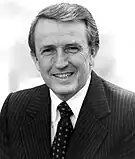 Senator Dale Bumpers of Arkansas
Senator Dale Bumpers of Arkansas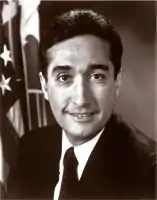 Mayor Henry Cisneros of San Antonio, Texas
Mayor Henry Cisneros of San Antonio, Texas
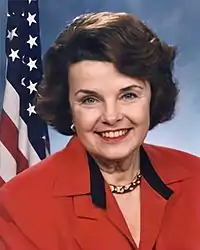
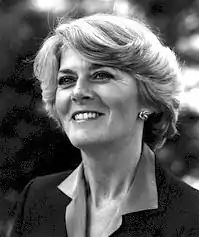 Representative Geraldine Ferraro of New York
Representative Geraldine Ferraro of New York Governor Bob Graham of Florida
Governor Bob Graham of Florida
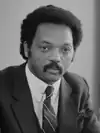 Reverend Jesse Jackson of Illinois
Reverend Jesse Jackson of Illinois.jpg.webp) Mayor Wilson Goode of Philadelphia, Pennsylvania
Mayor Wilson Goode of Philadelphia, Pennsylvania
See also
References
- ↑ Larry J. Sabato's Feeding Frenzy (July 21, 1998). "Jesse Jackson's 'Hymietown' Remark – 1984". The Washington Post. Retrieved May 1, 2010.
- 1 2 Evan Thomas (1984-07-02). "Trying to Win the Peace". Time. Archived from the original on September 30, 2007.
- ↑ Raines, Howell (19 February 1984). "Candidates Facing First Major Test in Iowa Caucuses". The New York Times.
- ↑ "Caucus history: Past years' results". Archived from the original on 2016-11-08. Retrieved 2021-07-20.
{{cite web}}: CS1 maint: bot: original URL status unknown (link) - ↑ Ed Magnuson (1984-06-18). "Over the Top, Barely". Time. Archived from the original on November 2, 2007.
- ↑ George J. Church (1984-06-04). "A Big Bicoastal Finale". Time. Archived from the original on December 12, 2008.
- 1 2 Evan Thomas (1984-06-11). "Last Call, and Out Reeling". Time. Archived from the original on April 21, 2008.
- ↑ Mondale's Acceptance Speech, 1984, AllPolitics
- ↑ "Second former Florida governor surprise entry in N.H. Primary - UPI Archives".
- ↑ "Six California House Members Switch: Cranston To Mondale". The Napa Valley Register. March 3, 1984. p. 13. Retrieved May 13, 2022.
- 1 2 3 4 5 6 7 8 9 10 11 12 13 "Democrats Choose Delegates". The New York Times. January 24, 1984. Retrieved August 11, 2014.
- ↑ Crowder, Ken; Gannaway, Glenn (March 27, 1984). "No winner in Lee, WIse caucuses". Kingsport Times-News. p. 15. Retrieved May 13, 2022.
- 1 2 3 Lynn, Frank (January 15, 1984). "State Drawing Presidential Hopefuls State". The New York Times. Retrieved August 11, 2014.
- ↑ Hyde, John (January 26, 1984). "Harkin, Bedell, Smith win seats at convention". The Des Moines Register. p. 4. Retrieved May 13, 2022.
Harkin and Bedell have endorsed the candidacy of former Vice President Walter Mondale.
- ↑ Moses, Charles T. (April 1, 1984). "Primary Called Test of Black Voting Power". Newsday (Suffolk Edition). p. 15. Retrieved May 13, 2022.
Others closely tied to the Democratic Party structure, including Rep. Charles Rangel (D-Manhattan), national vice chairman for Walter Mondale's campaign and a powerful leader in the black community, have described Jackson's candidacy as one blacks cannot afford to endorse.
- 1 2 3 4 Raines, Howell (January 29, 1984). "Southern Primaries Could Spell Trouble For Glenn". The New York Times. Retrieved August 11, 2014.
- 1 2 3 4 Raines, Howell (October 20, 1983). "Democrats Pursue Southern Support". The New York Times. Retrieved August 11, 2014.
- ↑ Boyd, Gerald M. (December 11, 1983). "Alabama Blacks' Group Decides To Back Mondale-Jackson Ticket". The New York Times. Retrieved August 11, 2014.
- 1 2 Raines, Howell (December 12, 1983). "MONDALE HAD GOOD '83 – NOW THE REAL TEST BEGINS". The New York Times. Retrieved August 11, 2014.
- 1 2 3 Smith, Hedrick (February 25, 1984). "Experts Say The South Looks Blead For Glenn". The New York Times. Retrieved August 11, 2014.
- 1 2 HOWELL RAINES (November 4, 1983). "A Provocative Candidate". The New York Times. Retrieved August 11, 2014.
- 1 2 Gailey, Phil (December 5, 1983). "Political Potholes Ahead For Traveling Democrats". The New York Times. Chicago (Ill). Retrieved August 11, 2014.
- ↑ Raines, Howell (October 19, 1983). "Politics – Hart'S Tactics Askew'S Train And Film Anxieties". The New York Times. Retrieved August 11, 2014.
- ↑ Rainie, Harrison (June 7, 1984). "Urge Hart to pack it in for unity". Daily News. p. 34. Retrieved May 13, 2022.
- ↑ HOWELL RAINES (February 26, 1984). "8 DEMOCRATS GIRD FOR KEY PRIMARY IN NEW HAMPSHIRE". The New York Times. New Hampshire. Retrieved August 11, 2014.
- ↑ Abramson, Rudy; Oates, May Louise (March 8, 1984). "Senator Accuses Reagan of Using Divisive Issues". The Los Angeles Times. p. 1. Retrieved May 13, 2022.
- 1 2 Plotz, David (1999-08-20). "Warren Beatty". Slate Magazine. Retrieved 2022-12-24.
- ↑ Smothers, Ronald (November 1, 1983). "Democratic Candidates Welcome Jackson Bid For Nomination". The New York Times. Retrieved August 11, 2014.
- 1 2 3 Smothers, Ronald (November 4, 1983). "Jackson Declares Formal Candidacy". The New York Times. Retrieved August 11, 2014.
- ↑ "Orval Faubus Supporting Jackson". The Charlotte Observer. March 10, 1984. p. 6. Retrieved May 13, 2022.
- ↑ Smothers, Ronald (December 28, 1983). "Jackson Wins Attention But Strength Is Unclear". The New York Times. Retrieved August 11, 2014.
- 1 2 Ronald Smothers (March 12, 1984). "Alabama Black Leaders Are Urging Pragmatism In Supporting Mondale". The New York Times. Retrieved August 11, 2014.
- 1 2 Smothers, Ronald (January 15, 1984). "Jackson Attracts Crowds, But Planning Is Erratic". The New York Times. Retrieved August 11, 2014.
- ↑ Canerdy, Beverly (March 12, 1984). "D.C. mayor stumps for Jackson". Clarion-Ledger. p. 12. Retrieved May 13, 2022.
- 1 2 3 Boyd, Gerald M. (February 14, 1984). "Black Churches A Mainspring Of Jackson'S Efforts". The New York Times. Retrieved August 11, 2014.
- ↑ Raines, Howell (December 2, 1983). "Jackson Gets Support, Apparently Without Poll Of The Group". The New York Times. Retrieved August 11, 2014.
- ↑ "Barry Commoner Vows To Back Jesse Jackson". The New York Times. August 30, 1983. Retrieved January 18, 2015.
- ↑ "South Carolina Political Collections – University Libraries | University of South Carolina". sc.edu.
- ↑ Tom Sherwood (December 15, 1983). "Del. Pickett to Head Mondale's Va. Race". The Washington Post.
- 1 2 "Winchester Star Newspaper Archives February 10, 1984 Page 18". 10 February 1984.
- ↑ "Anna Belle Clement O'Brien passes away at 86". Archived from the original on 6 September 2009.
- ↑ "Glenn camp can't afford loss in South". The Morning Call. March 11, 1984. p. 7. Retrieved May 13, 2022.
Glenn was endorsed Friday by Sen. Sam Nunn, D-Ga., who said he cast his absentee ballot for the Ohio senator.
- ↑ Robinson, Walter V. (January 21, 1984). "Glenn says a Mondale comment 'goes too far'". The Boston Globe. p. 6. Retrieved May 13, 2022.
- ↑ "GLENN SEEKING TO TURN A HERO'S IMAGE INTO VOTES". The New York Times. June 15, 1983. Retrieved January 18, 2015.
- ↑ "Ferraro collects pledges of support from state's major political groups". The Montgomery Advertiser. August 26, 1984. p. 2. Retrieved May 13, 2022.
- ↑ "Durrette criticizes Robb for endorsing Mondale". Kingsport Times-News. September 25, 1984. p. 11. Retrieved May 13, 2022.
- ↑ "Askew Ends Presidential Campaign". The Miami Herald. March 2, 1984. p. 17. Retrieved May 13, 2022.
One who apparently dissuaded him was Gov. Bob Graham, who steadfastly supported Askew for president.
- ↑ "ASKEW TELLS MOBILE HE 'FEELS GOOD' ABOUT RACE". The New York Times. February 7, 1984. Retrieved January 18, 2015.
- ↑ "Gallup Poll Has Kennedy Leading Democrats". The New York Times. 16 May 1982. p. 23.
- 1 2 3 4 5 6 7 8 9 10 11 12 13 14 15 "US President - D Primaries (Polling)". OurCampaigns. Retrieved 31 March 2020.
- ↑ "Poll Finds Democrats Favor Mondale for '84". The New York Times. 15 Jan 1983. p. 11.
- ↑ "Our Campaigns - US President - D Convention Race - Jul 16, 1984". www.ourcampaigns.com.
- ↑ "Trying to Win the Peace". Time. July 2, 1984. Archived from the original on September 30, 2007. Retrieved May 1, 2010.
.jpg.webp)
.jpg.webp)
